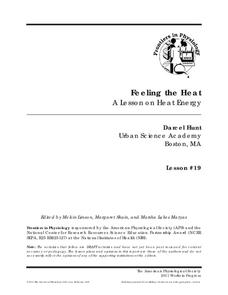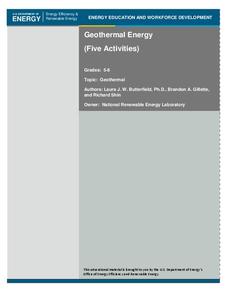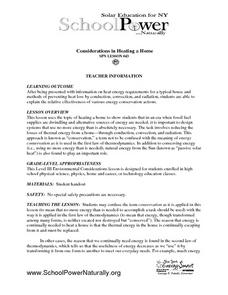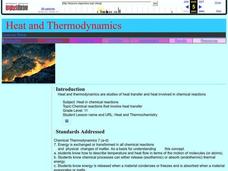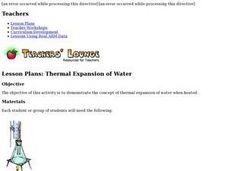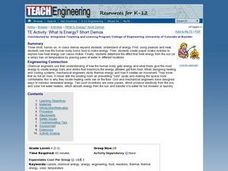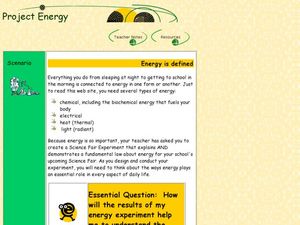American Physiological Society
Feeling the Heat
How do the changing seasons affect the homes where we live? This question is at the forefront of engineering and design projects. Challenge your physical science class to step into the role of an architect to build a model home...
Rochester Institute of Technology
Heat Transfer
Use an exciting role play activity to teach young chemists about the importance of heat transfer in maintaining homeostasis. They assume the role of a dog sled owner who has been abandoned and must fend for themselves with only a...
US Department of Energy
Geothermal Energy
With Earth Day quickly approaching, as well as many science fairs, why not challenge your class to investigate geothermal energy or other renewable energy resources? There are five driving questions explored in depth here, as well as...
Science Matters
Thermal Energy Flow in Materials
The sun sends the earth 35,000 times the amount of energy required by all of us on the entire planet, every day. The fourth lesson in the 10-part series looks at how light energy from the sun transfers into thermal energy. Scholars build...
Curated OER
Heat, Temperature, and Transfer
Physical science scholars discover an array of heat sources. They experiment to connect radiation to heat. They begin to understand thermal equilibrium. Then, they test to see if mass affects the rate of temperature change. Choose a few,...
Curated OER
Heat and the Second Law of Thermodynamics
More than a week's worth of investigation is provided in this source. Physical science stars experiment to describe specific heat, conduction, convection, and radiation. They also discover the relationship between mechanical and thermal...
Science 4 Inquiry
Investigating How Heat Flows
It is impossible to cool down a glass of water by adding ice. Young scientists explore heat transfer through videos, experiments, and interactive games. They quickly catch on that the water melts the ice and things aren't always as they...
Curated OER
Considerations in Heating a Home
Emerging engineers discover how important it is to conserve energy as fossil fuel supplies are being diminished. This is accomplished by working through a handout that explains energy requirements for heating a home during the winter....
Curated OER
Temperature and Thermal Energy
Examine how heat can be transferred between systems by reconstructing a diagram on energy flow and solving problems on heat flow and work done.
Curated OER
Heat and Thermodynamics
This is actually a 10-day mini unit on thermal energy for your high school chemists. Every avenue is taken to get learners absorbed in heat: a pretest, a PowerPoint presentation, Internet exploration, demonstrations, lab activities, and...
Curated OER
Melting the Ice: Energy Transfer
Learners study thermal energy and energy transfer to sea ice processes. In this energy transfer lesson, students make their own ice cream and discuss energy transfer and thermal energy. Learners view a radiation overhead and its role in...
Teach Engineering
Energy Efficiency
Using the resource is probably the most efficient way to learn about efficiency. The 18th installment of a 25-part Energy Systems and Solutions unit has pupils investigate energy efficiency through discussions and associated activities....
Teach Engineering
Energy Basics
Power up your lessons with an energetic resource. Scholars learn about work, force, energy, and power. They consider the relationships between these quantities through hockey puck scenarios and make calculations using formulas.
Cornell University
Energy Changes in Chemical Reactions
The heat of solution measures how much thermal energy a dissolving substance consumes or gives off. The experiment demonstrates both endothermic and exothermic reactions. Scholars dissolve several substances, measure the temperature...
US Department of Energy
Thermal Expansion of Water: Rise of Sea Level
Using bunsen burners, Erlenmeyer flasks, thermometers, hollow glass tubes, stoppers, and rulers, learners experiment with and measure how water expands when heated. The activity connects the expansion of water when heated to global...
Curated OER
Transfer of Thermal Energy
Students define temperature and heat, distinguish between temperature and heat flow, calculate amount of heat energy released or absorbed in chemical process, and design procedure, through experimentation, to gather and evaluate data to...
Curated OER
Energy Transfer in Musical Instruments
Students create unique sounds using different instruments. In this energy instructional activity, students read and define several vocabulary terms such as heat, energy transfer and thermal equilibrium. Students utilize...
Curated OER
What Is Energy? Short Demos
Students engage in three short, hands-on, in-class demos which expand students' understand of energy. First, using peanuts and heat, students see how the human body burns food to make energy. Then, they create paper snake mobiles to...
NASA
Hurricanes as Heat Engines
Hurricanes are a destructive yet fascinating phenomenon. Individuals examine evidence that hurricanes use thermal energy from the ocean as they approach land. Learners use images, charts, and graphs to collect data and then draw...
Curated OER
Project Energy
Young scholars explore multiple types of energy. In this energy instructional activity, students prepare a science fair project through completing a WebQuest. Young scholars investigate radiant, thermal, and biochemical energy.
Curated OER
Urban Heat Islands: An Introduction to Energy Transfer and Transformation
Elementary school physical scientists explore kinetic mechanical energy by dropping a golf ball on different surfaces. They discuss how human made materials might react to light differently from nature made materials. This lesson plan...
American Chemical Society
Changing the Density of a Liquid - Heating and Cooling
During a unit on density, pupils ponder whether or not temperature affects this property. By carefully inserting blue cold water and yellow hot water into a room-temperature sample, they will see the answer. Make sure to have done the...
Space Awareness
Oceans as a Heat Reservoir
Oceans absorb half of the carbon dioxide and 80 percent of the greenhouse gases released into the atmosphere. Scholars learn how and why the oceans store heat more effectively than land and how they help mitigate global warming. Pupils...
Curated OER
Heat Transfer
Students examine heat transfer using energy efficient houses. In this heat transfer lesson students calculate the heat that is transferred between a system and its surroundings.
